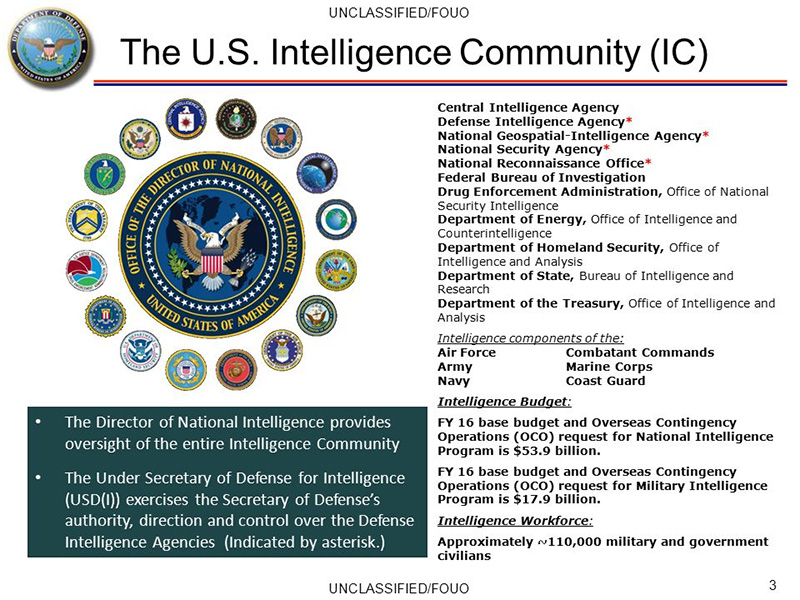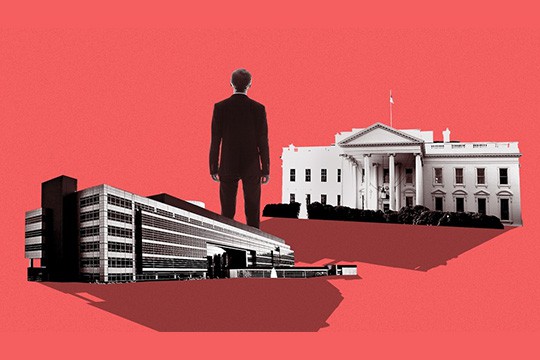Pic.: The Atlantic
“Individuals looked to avoid conflict and please political masters,” a Pentagon-backed RAND corporation study finds, notes ‘The Intercept’.
U.S. intelligence skews its findings to find favor with both Republican and Democratic policymakers, including former presidents Donald Trump and Barack Obama, a sweeping new study by the Pentagon-backed RAND Corporation finds. The study draws on interviews, some anonymous, with nearly a dozen current and former U.S. intelligence officials and policymakers.
Despite the popular “deep state” characterization of the intelligence community as a rogue army running roughshod over elected leaders, the study concludes the exact opposite. It portrays an intelligence community that naturally tilts its reports and forecasts to curry favor with presidents and their high-level policymakers in Washington, regardless of party or issue.
“Policymakers most frequently introduce bias in intelligence assessments from a desire to minimize the appearance of dissent, while the IC” — intelligence community — “tends to introduce bias through self-censorship,” the report says.

The study, “Has Trust in the U.S. Intelligence Community Eroded? Examining the Relationship Between Policymakers and Intelligence Providers,” was sponsored by the Pentagon.
From 9/11 to January 6, there’s hardly a shortage of intelligence failures to properly assess the big picture or anticipate crises, leading to a decline in trust by policymakers, some of whom have decried the intelligence community as a monolithic “deep state” outside of their control. But the study suggests that these policymakers often have themselves to blame for pressuring the intelligence community to come to certain conclusions in line with their political interests — in many cases successfully.
Far from the Hollywood picture of intelligence operatives as ruthless Jason Bourne types, interviewees complained about the pressure analysts and management faced from White House policymakers, with one likening it to bullying.
The “culture of fear was real,” one former intelligence official told RAND. “The IC gets tired of being bullied, then they withdraw.”
“Individuals looked to avoid conflict and please political masters,” the study says of the intelligence community analysts and officials, adding that the CIA and other agencies have “an incentive to elicit positive feedback from policymakers” in order to “maintain [their] relevance.”
Ironically, despite Trump’s repeated insinuations of a “deep state” bent on undermining him, the very intelligence agencies ended up watering down assessments in order to avoid confrontations. As the study observes, “IC analysts looked to avoid conflict with policymakers and avoid charges of being part of the ‘deep state.’”
The intelligence community’s deference to its political masters was by no means confined to the Trump administration. One former official told RAND that the “process always involves some degree of give and take between analysts and policymakers.” Indeed, the report provides a number of examples of intelligence bias during the Obama administration.
John A. Gentry, a former Defense Intelligence Agency analyst during the Obama administration, is quoted as saying that superiors told analysts to avoid “specifically identified terms that might trigger criticism of administration policy,” the study notes. Gentry also said that during the Obama years, intelligence analysis suffered from “politicization by omission”: leaving out issues from regular updates or assessments “because the results might displease superiors.”
In 2015, the year before Trump was elected, a survey of the members of the U.S. Central Command — the Pentagon’s combatant command for the Middle East — found that over 65 percent of respondents believed that their analysis was suppressed or distorted in the face of evidence due to editorial disagreement, politicization, or a mismatching with existing analytic lines, the study also notes.
Rather than in the direction of Langley, the Pentagon, or any intelligence agency, RAND concludes that the IC largely tilts toward the White House and its army of political appointees.
Clearly the intelligence community tilts its findings; but rather than in the direction of Langley, the Pentagon, or any intelligence agency, RAND concludes that it largely tilts toward the White House and its army of political appointees.
“The RAND report provides an accurate picture of how much the intelligence-policy relationship sometimes departs depressingly far from the ideal of intelligence providing unbiased analysis to policymakers who use it to inform their decision-making,” Paul Pillar, a former national intelligence officer who is now a fellow at Georgetown University’s Center for Security Study as well as the Quincy Institute, told The Intercept.
“The report shows the variety of ways in which policymakers who are determined to use intelligence not to inform decisions but instead to sell their already established policies can pollute the process, ranging from blatant arm-twisting to subtle effects on the minds of intelligence officers who do not want to rock the boat,” Pillar said.
read more in our Telegram-channel https://t.me/The_International_Affairs

 11:35 01.04.2024 •
11:35 01.04.2024 •























